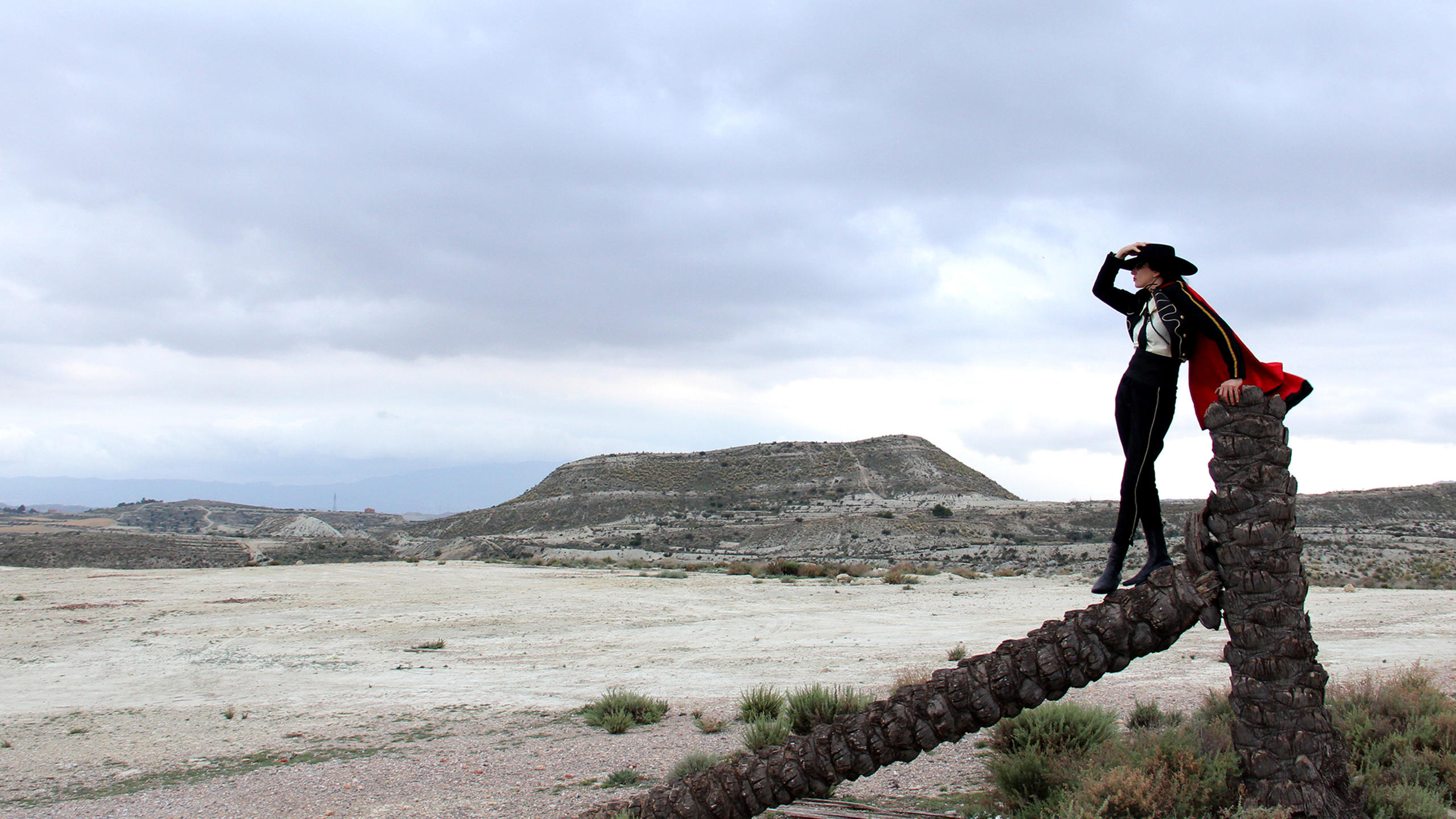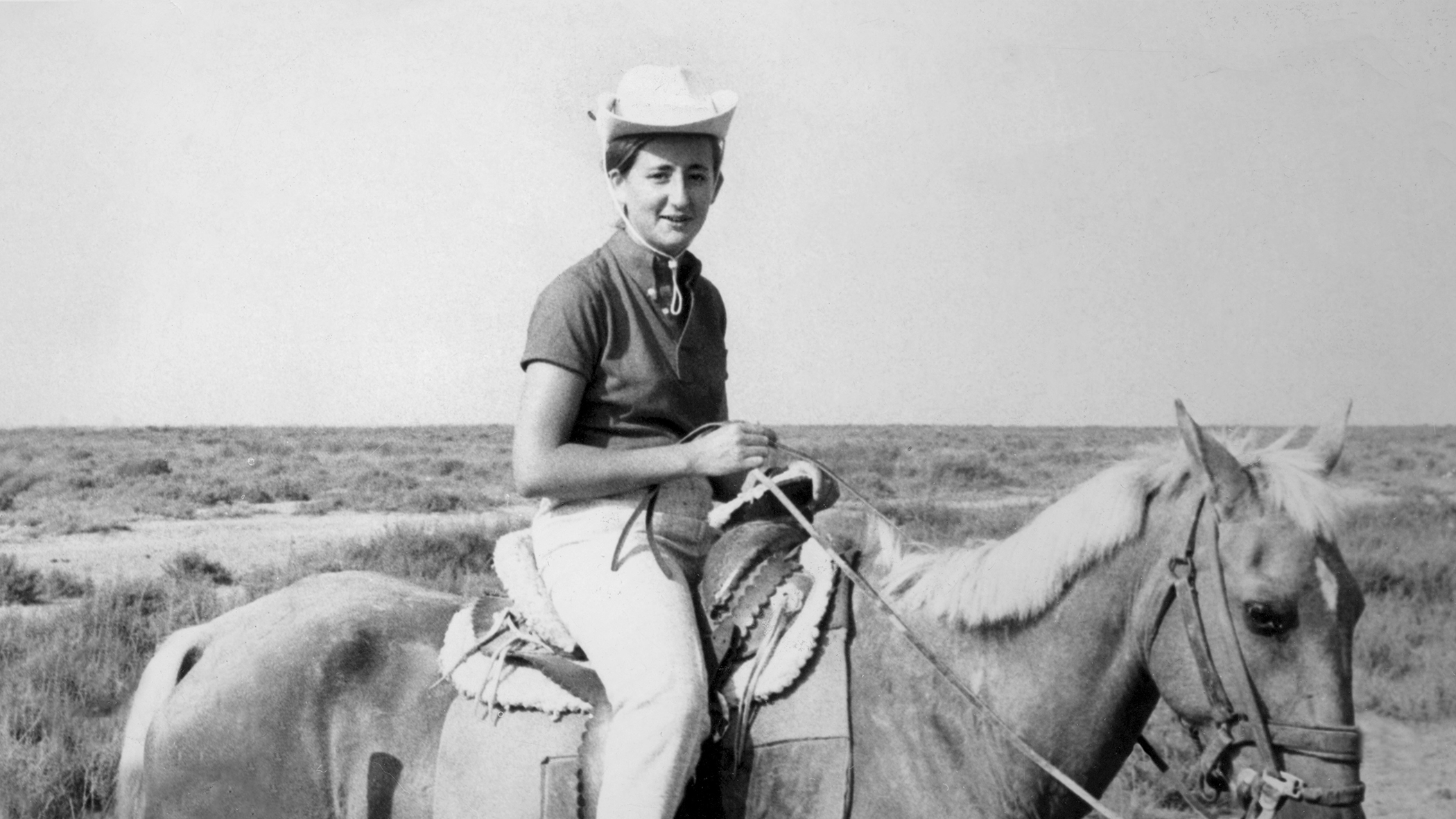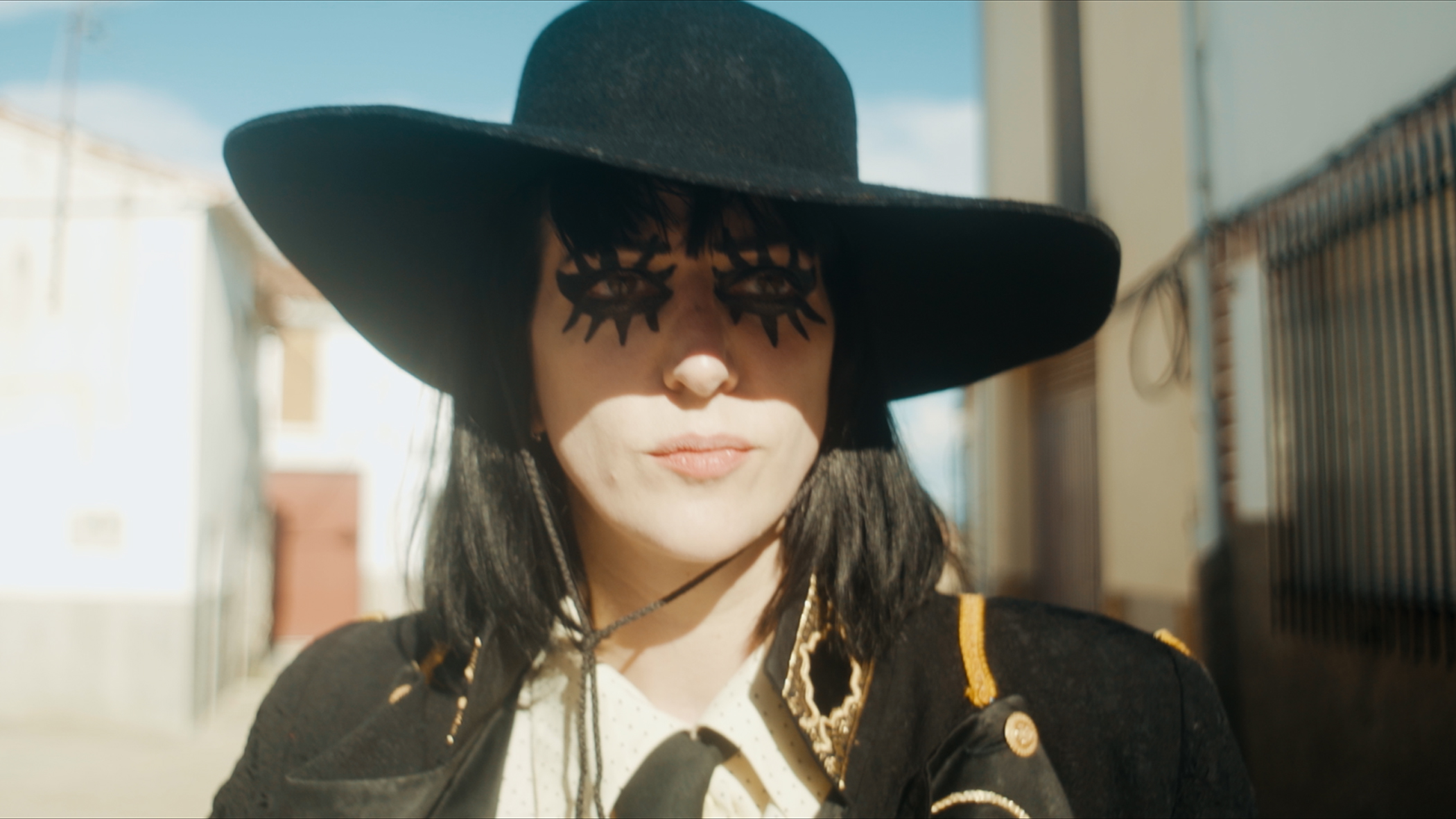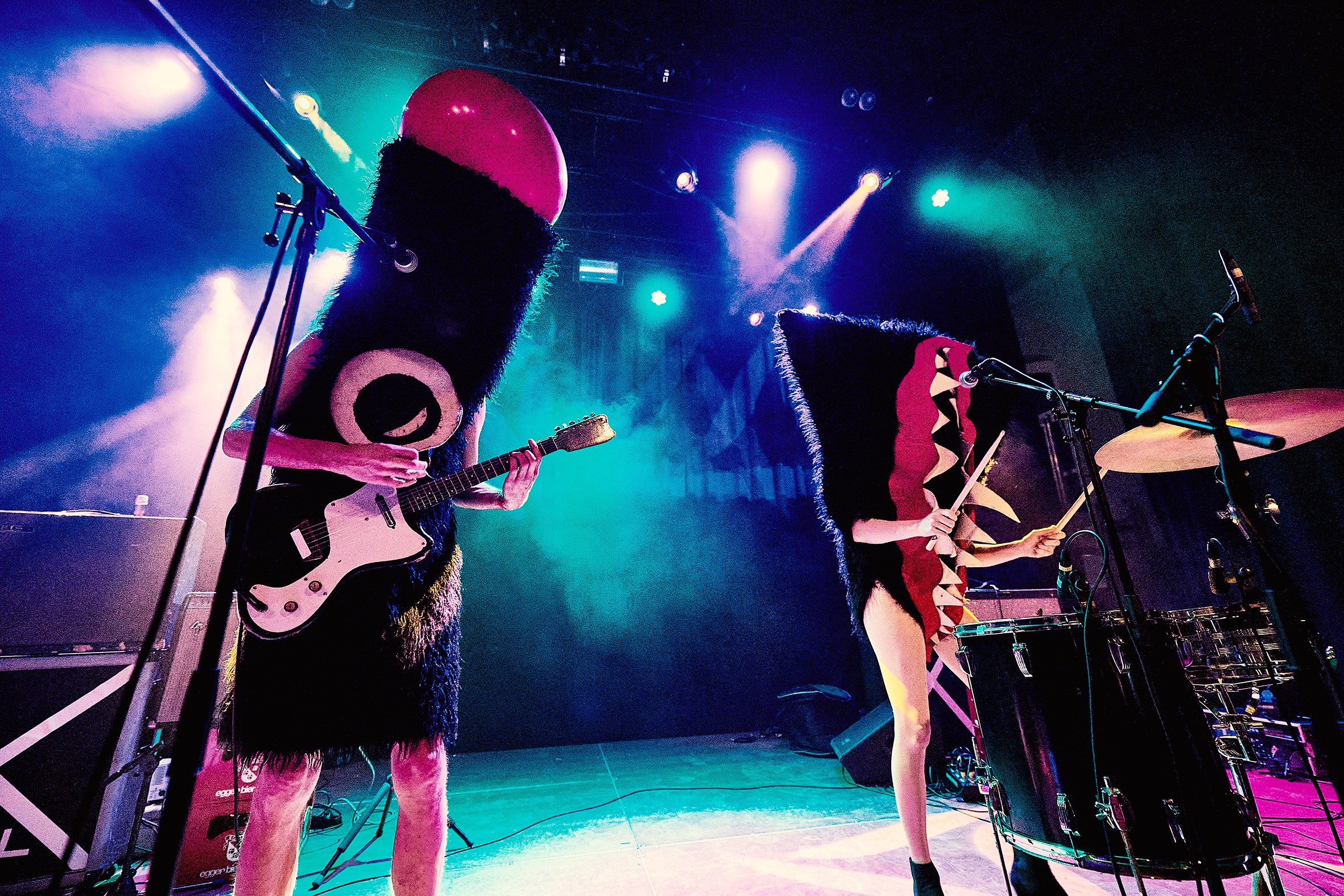‘Las Toreras’ grabs Spanish-Swiss tragedy by the horns

A new documentary by Swiss artist Jackie Brutsche tells a story of art and reconciliation, of a family taboo and of a suicide causing a rift in a Spanish-Swiss family.
A barren desert. A long-haired figure in black, wearing a flowing cape, a cowboy hat, matching boots and sun-shaped eyeliner. A ghostly woman in a white mask. What may sound like the set-up for an acid western from the 1970s directed by the avant-guard Chilean director Alejandro Jodorowsky, is actually the framing device of a film from the opposite end of the genre spectrum: a new Swiss documentary called Las Toreras (The female bullfighters).
The brooding lone ranger, whose metaphorical pursuit of the white-masked apparition is interwoven with the film’s more strait-laced approach to non-fiction storytelling, is quickly identified as Jack Torera, a stage alter ego created by Las Toreras’s director, Bern-based musician, filmmaker, performer and visual artist Jackie Brutsche. And it is through Jack that Brutsche begins her deeply personal story – “a story that has never let go of me,” as the film’s opening narration announces.
Las Toreras chronicles – and, in doing so, strives to unpack – the complex prehistory, the multi-layered aftermath and the border-crossing emotional fallout of a singular traumatic event in Brutsche’s life: in 1987, when she was just ten years old, her Spanish-born mother, Carmen, killed herself in Zurich’s Oerlikon district.
Mental illness, Swiss machismo
A suicide tends to cast a long and jagged shadow, and Carmen’s is no exception: indeed, even more than three decades on, it continues to be a painful taboo on both sides of Brutsche’s family.
On the one hand, there is the Swiss contingent – most notably Brutsche’s psychologist father Paul and her older brother Juan Pablo – who recall a free-spirited and loving wife and mother, who gradually fell prey to a hereditary mental illness.
On the other hand, there are Carmen’s siblings – soft-spoken Ángel, abrasive Juan José and feisty Eloísa – whose own memory is imbued with an unmistakable anger at Paul and their late sister’s adopted home country as a whole.
In Spain, they had experienced Carmen as a fun-loving sister – who then emigrated to the colder climes and the unfamiliar culture of Switzerland, married an irresponsible husband, and whose spirit was crushed by “the machismo in Switzerland” as Juan José puts it to a taken-aback Brutsche, to whom, at one point, all of this sounds utterly wrong.

It isn’t hard to see why, save for a handful of visits by Brutsche over the course of 25 years, the two sides of the family are functionally estranged. When I ask her about her relationship with her Spanish family prior to filming, she says that, having visited Spain regularly as a child, “it never quite relinquished its hold on me”.
Hence, the contradictory views on Carmen’s death were something Brutsche didn’t want to leave unresolved any longer: “I wanted to learn about ‘the Spanish perspective’, ‘the other side’ so to speak – and show them the Swiss perspective. I was missing big pieces of the puzzle on both sides of the family.”
Reflecting on the change in the relationship effected by Las Toreras, Brutsche stresses that the documentary ultimately helped her make better sense of her Spanish relations’ contrarian narrative. “My mother’s mental illness left a pile of broken glass, so I can see how this led to misunderstandings, to false information making the rounds.”

In addition, thanks to the discovery of her mother’s notebooks and diaries, allowing Carmen to “speak for herself and make visible her inner life”, Brutsche’s film even facilitated a long-deferred familial reconciliation.
Culture clash
Socio-cultural differences might also have accounted for some of these once-acute differences in perspective. Carmen came from a household where talk of mental illness was discouraged; she also came of age in Francoist Spain, where such an illness was an even bigger social stigma than it is today. Between these factors and the lack of information available to her siblings, “it seemed more logical to chalk up these psychological problems to external factors”. Brutsche says.
By contrast, “the people in Switzerland identified, based on their knowledge of Carmen’s family history, her hereditary propensity for mental illness as the main reason” for her emotional struggles.
But Las Toreras is not only an instance of Brutsche bridging the gap between Switzerland and Spain: as epitomised by the figure of Jack Torera, it also connects the different worlds the director inhabits.
The filmmaker as performer
While she holds a film degree from Zurich University of the Arts, perhaps German-speaking Switzerland’s most prominent incubator of artistic talent, her decision to turn her family’s story into an emotionally sensitive feature-length documentary might be seen as anything but an obvious decision – considering that she is more famous for her uncompromisingly humorous, proudly theatrical, envelope-pushing expressionist art.
Brutsche plays in two bands (whose music videos she regularly writes, directs and edits): Swiss garage group The JacketsExternal link, in whose output Jack Torera is a fixture, and The Sex OrgansExternal link – a two-piece outfit for which she and Dutch collaborator Bone dress up as a vagina- and a penis-shaped alien, respectively.

She has gone solo too, most notably in the form of her one-woman stage shows, which combine themes of female emancipation and anti-authoritarian rebellion with The Jackets’ and The Sex Organs’ gender-bending aesthetics: 2010’s The Moustache Princess tells the story of an unhappy pop star’s facial-hair-themed (mis)adventures, while 2013’s The Rebel Sperm follows a spermatozoon leading a scrotal revolt in order to outsmart a contraceptive coil.
But where some might see a tonal discontinuity between these projects’ rebellious rock’n’roll irreverence and Las Toreras’s more ostensibly sombre narrative, Brutsche sees a logical continuation: “The image of my mother, a woman who often dreamed of a different life and unattainable goals, always informed the topics I address in my work. Through my art, I could connect with her and find a positive way of dealing with her fate.”
The involvement of the larger-than-life Jack Torera in the film underscores this: “I absolutely did not want to make just another depressing documentary about suicide. I wanted to showcase my affirmative, playful approach to this painful history and emphasise the idea that one can draw creative strength from tragedy.”
And Las Toreras is an emblematic example. Through it, Brutsche has been able to bring together the two parts of her family and, after years of them not being on speaking terms, engage them in a cathartic dialogue that has achieved the long-elusive reconciliation. “All of my work has led up to this film,” she says.

In compliance with the JTI standards
More: SWI swissinfo.ch certified by the Journalism Trust Initiative

You can find an overview of ongoing debates with our journalists here . Please join us!
If you want to start a conversation about a topic raised in this article or want to report factual errors, email us at english@swissinfo.ch.